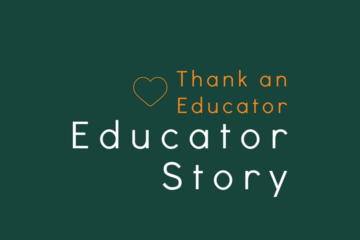This week, we are featuring, Dr. Gary Roloff, Professor and Chair in the Department of Fisheries and Wildlife. Dr. Roloff was recognized via iteach.msu.edu's Thank and Educator Initiative! We encourage MSU community members to nominate high impact Spartan educators (via our Thank an Educator form) regularly!
Read more about Dr. Roloff’s perspectives below. #iteachmsu's questions are bolded below, followed by his responses!
In one word, what does being an educator mean to you?
Empowering
Share with me what this word/quality looks like in your practice?
As an educator, I look to facilitate critical thinking, synthesis of ideas and information, acquisition of contextual knowledge, and informed judgment that ultimately results in empowered, confident decision-making and choices by our students.
Have your ideas on this changed over time? if so how?
My philosophy on this has absolutely changed over time. When I initially started teaching I leaned towards emphasizing contextual knowledge (e.g., why snowshoe hare are white in winter, why pigs turn feral so fast when released into an unconstrained environment), where there was a clear answer that could be assessed for correctness. I quickly realized that guidance for students on synthesizing and integrating contextual knowledge (and other pieces of information) to make informed arguments and decisions was a gap in my learning outcomes. Since then, I’ve worked to correct that deficiency in my course offerings.
Tell me more about your educational “setting.” This can include, but not limited to departmental affiliations, community connections, co-instructors, and students.
I am lucky enough to teach a field-based course in wildlife research and management techniques (I also teach a graduate-level course), which includes a blend of classroom and field experiences. Much of the class is hands-on and outside, and I involve our agency partners like the Michigan Department of Natural Resources and USDA Wildlife Services to teach sections of the class. This professional-student interaction is often a highlight for the students, providing an important opportunity to help build a professional network that is so critical to success. Some students in my class have gone on to work for the agencies that help me teach.
What is a challenge you experience in your educator role?
My biggest challenge is reading the classroom early and trying to adjust my delivery of content to the different learning styles that I know occur in the room. As instructors, if we fail to recognize and adjust our content and delivery to appeal to diverse learning styles we are not being fair.
Any particular “solutions” or “best practices” you’ve found that help you support student success at the university despite/in the face of this?
I started implementing a brief survey at the start of the semester in my undergraduate class to gauge personality types. The students work in groups in that class on a semester project that looks for integration and synthesis across the semester. One of my PhD students, as part of her FAST Fellows program, showed that “introverts” were at a significant disadvantage in these types of settings, unless we were able to integrate them into “extrovert” groups from the start. I stopped letting students form groups on their own, as the “introverts” and “extroverts” tended to group together; instead I purposefully mix the personality types to help create a more equitable chance of success for all students in the class.
What are practices you utilize that help you feel successful as an educator?
Last fall, I changed my standard assessment technique for the mid-term. I used to implement a standard type test, where students identify things and answer questions on paper. This fall I changed the mid-term to a field practical, where I interacted verbally with the students (i.e., an oral exam) and had them show me how to do things and explain their answers. This one-on-one assessment, though time-consuming, gave me a better sense (I believe) of how the students were learning the course content.
What topics or ideas about teaching and learning would you like to see discussed on the iteach.msu.edu platform? Why do you think this conversation is needed at msu?
Efficient, effective ways to teach our students better oral and written communication skills as part of the classes they take.
What are you looking forward to (or excited to be a part of) next semester?
I really miss the energy of campus; I’m hoping we can return to some sense of post-pandemic normalcy soon.
Don't forget to celebrate individuals you see making a difference in teaching, learning, or student success at MSU with #iteachmsu's Thank an Educator initiative. You might just see them appear in the next feature! Follow the MSU Hub Twitter account to see other great content from the #iteachmsu Commons as well as educators featured every week during #ThankfulThursdays.


